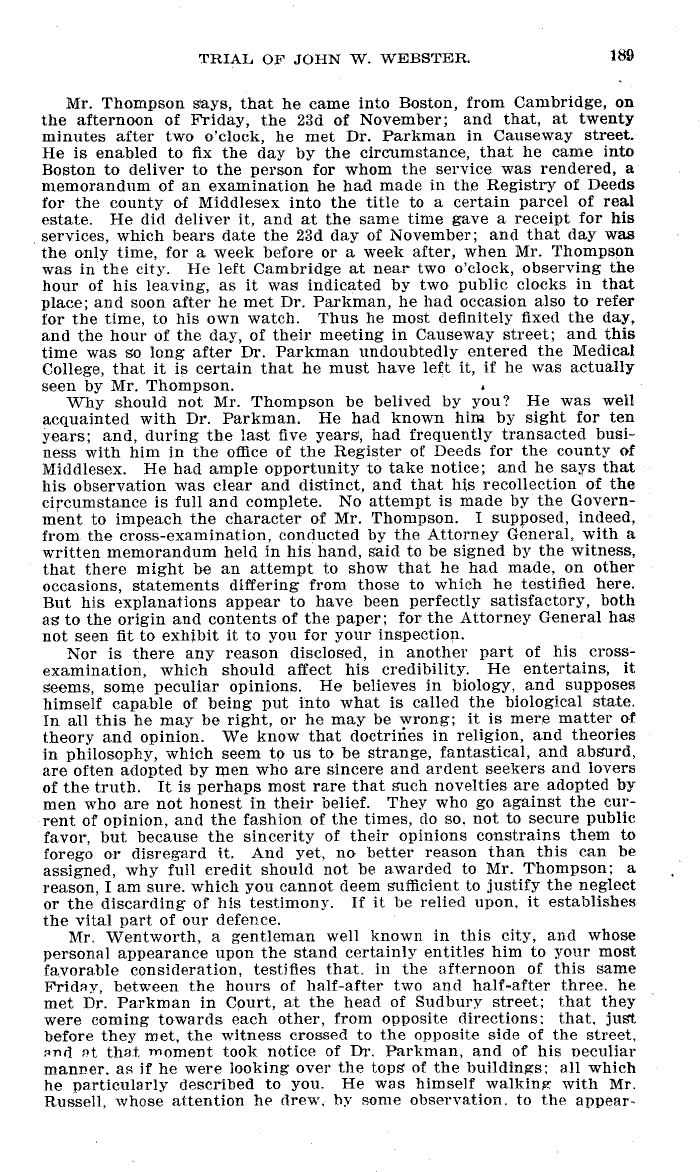|
TRIAL of JOHN W. WEBSTER.
Mr. Thompson says, that he came into Boston, from Cambridge, on
the afternoon of Friday, the 23d of November; and that, at twenty
minutes after two o'clock, he met Dr. Parkman in Causeway street.
He is enabled to fix the day by the circumstance, that he came into
Boston to deliver to the person for whom the service was rendered, a
memorandum of an examination he had made in the Registry of Deeds
for the county of Middlesex into the title to a certain parcel of real
estate. He did deliver it, and at the same time gave a receipt for his
services, which bears date the 23d day of November; and that day was
the only time, for a week before or a week after, when Mr. Thompson
was in the city. He left Cambridge at near two o'clock, observing the
hour of his leaving, as it was indicated by two public clocks in that
place; and soon after he met Dr. Parkman, he had occasion also to refer
for the time, to his own watch. Thus he most definitely- fixed the day,
and the hour of the day, of their meeting in Causeway street; and this
time was so long after Dr. Parkman undoubtedly entered the Medical
College, that it is certain that he must have left it, if he was actually
seen by Mr. Thompson.
Why should not Mr. Thompson be belived by you? He was well
acquainted with Dr. Parkman. He had known him by sight for ten
years; and, during the last five years, had frequently transacted busi-
ness with him in the office of the Register of Deeds for the county of
Middlesex. He had ample opportunity to take notice; and he says that
his observation was clear and distinct, and that hits recollection of the
circumstance is full and complete. No attempt is made by the Govern-
ment to impeach the character of Mr. Thompson. I supposed, indeed,
from the cross-examination, conducted by the Attorney General, with a
written memorandum held in his hand, said to be signed by the witness,
that there might be an attempt to show that he had made, on other
occasions, statements differing from those to which he testified here.
But his explanations appear to have been perfectly satisfactory, both
as to the origin and contents of the paper; for the Attorney General has
not seen fit to exhibit it to you for your inspection.
Nor is there any reason disclosed, in another part of his cross-
examination, which should affect his credibility. He entertains, it
seems, some peculiar opinions. He believes in biology, and supposes
himself capable of being put into what is called the biological state.
In all this he may be right, or he may be wrong; it is mere matter of
theory and opinion. We know that doctrines in religion, and theories
in philosophy, which seem to us to be strange, fantastical, and absurd,
are often adopted by men who are sincere and ardent seekers and lovers
of the truth. It is perhaps most rare that such novelties are adopted by
men who are not honest in their belief. They who go against the cur-
rent of opinion, and the fashion of the times, do so. not to secure public
favor, but because the sincerity of their opinions constrains them to
forego or disregard it. And yet, no better reason than this can be
assigned, why full credit should not be awarded to Mr. Thompson; a
reason, I am sure. which you cannot deem sufficient to justify the neglect
or the discarding of his testimony. If it be relied upon, it establishes
the vital part of our defence.
Mr. Wentworth, a gentleman well known in this city, and whose
personal appearance upon the stand certainly entitles him to your most
favorable consideration, testifies that. in the afternoon of this same
Friday, between the hours of half-after two and half-after three. he
met Dr. Parkman in Court, at the head of Sudbury street; that they
were coming towards each other, from opposite, directions; that, just
before they met, the witness crossed to the opposite side of the street,
and at that, moment took notice of Dr. Parkman, and of his peculiar
manper. as if he were looking over the tops of the buildings; all which
he particularly described to you. He was himself walking with Mr.
Russell, whose attention he drew, by some observation. to the appear-
|

